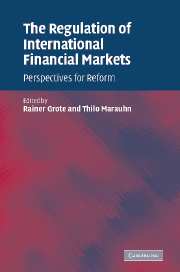Book contents
- Frontmatter
- Contents
- Notes on contributors
- Preface
- List of abbreviations
- Introduction: the regulatory dilemma in international financial relations
- PART I An historical perspective
- 1 Monetary governance and capital mobility in historical perspective
- PART II A comparative perspective
- PART III A public international law perspective
- PART IV An institutional perspective
- PART V A policy perspective
- Conclusions and agenda for further research
- Index
1 - Monetary governance and capital mobility in historical perspective
Published online by Cambridge University Press: 08 July 2009
- Frontmatter
- Contents
- Notes on contributors
- Preface
- List of abbreviations
- Introduction: the regulatory dilemma in international financial relations
- PART I An historical perspective
- 1 Monetary governance and capital mobility in historical perspective
- PART II A comparative perspective
- PART III A public international law perspective
- PART IV An institutional perspective
- PART V A policy perspective
- Conclusions and agenda for further research
- Index
Summary
Of all the challenges facing economic policymakers at the dawn of the new millennium, few are as daunting as the problem of governance of international financial markets and the free movement of capital. Half a century ago, after the ravages of the Great Depression and World War II, financial markets everywhere – with the notable exception of the United States – were generally weak, insular, and strictly controlled, reduced from their previously central role in global economic relations to offer little more than a negligible amount of trade financing. But then, in the 1950s, deregulation and liberalisation began to combine with technological and institutional innovation to breach many of the barriers separating national currencies and monetary systems. In a cumulative process driven by the pressures of domestic and international competition, the range of market opportunities has gradually widened for borrowers and investors alike. The result has been a remarkable growth of capital mobility across political frontiers, reflected in a scale of financial flows unequalled since the glory days of the nineteenth century gold standard. Elsewhere I have likened these dramatic developments to a phoenix risen from the ashes. The key issue, I wrote, is what the resurrection of international financial markets means for monetary governance and the authority of the contemporary sovereign state. ‘The phoenix has risen. Does it also rule the roost?’.
The search for effective responses to this daunting challenge must begin with a proper understanding of political and historical context.
- Type
- Chapter
- Information
- The Regulation of International Financial MarketsPerspectives for Reform, pp. 27 - 54Publisher: Cambridge University PressPrint publication year: 2006
- 2
- Cited by



